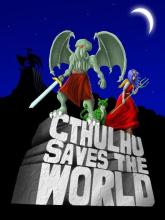Rating of
4.5/5
Taking the ‘J’ out of RPG
Nelson Schneider - wrote on 11/25/12
Zeboyd Games, a Western Indie company consisting of two dudes and a love of old-school gaming, specializes in comical visual novels and turn-based RPGs. The very existence of the company is also a credit to the Xbox Live Indie Games program, which allowed the duo to feel-out the market for parody games without a significant financial commitment. Thanks to the success of “Cthulhu Saves the World” (“CSW”), Zeboyd’s second turn-based RPG, on Xbox Live, the company was able to build enough Kickstarter funding to create an enhanced version of the game for distribution via Steam, which ended up being even more successful than the original release. Regularly priced at $3 for a two-pack, Zeboyd’s games are so inexpensive that anyone seeking a new turn-based RPG in 7th Generation (where that sub-genre is all but extinct) would need to be excessively thrifty to pass them up. But with a 50% of Steam sale dropping the price to $1.50 for two games, “CSW” is an impossible temptation to resist.
Presentation
“CSW” is purposefully retro. Instead of using high-definition sprites and still images, all of the game’s graphics look somewhere between something the NES could produce and something the SNES could produce. Character sprites are limited to 3 frames of animation while exploring and unseen during battles, as the battle engine uses a first-person perspective much like the older games in the ‘Dragon Quest’ series. Character portraits look like anime fan-art drawn in MS Paint. Enemy sprites are completely static aside from each enemy having a different pose for ‘sane’ and ‘insane’ states. The world map, towns, and dungeons are all tile-based.
But “CSW” doesn’t really look ‘bad’ anymore than a piece of medieval art looks bad. The game’s look is very faithful to the type of game and time period it is spoofing. Yes, the game’s graphics could have been better: I would have liked to see some enemy animations, and the character portraits are, for the most part, hilariously bad. However, looking dated while also taking itself seriously is part of what makes a good parody.
Unlike the graphics, the game’s music is pretty amazing. There are numerous tracks, with quite a few used only in a single dungeon, all of which are fairly long, and most of which are pleasant to listen to. The battle theme, overworld theme, and town themes specifically feel right at home in a 8/16-bit RPG. Of course, the soundtrack is all MIDI-quality.
Technically, “CSW” is rock solid… until the bonus game modes that unlock after beating the main game. These extras were added to the PC release and one in particular, the ‘Cthulhu’s Angels’ remix mode, has some major bugs (like bugged character stat growth and needing to re-equip everyone after loading a saved game in order to apply stat-boosts from equipment) that still haven’t been fixed.
Story
Much like the ‘Earthbound’ (‘Mother’ in Japan) series by Nintendo, “CSW” is a parody RPG. In this case, the game is a spoof on H.P. Lovecraft’s horror writings about insanity-causing Elder Gods mixed with the tropes and conventions of classic RPGs.
The result is a bizarre and twisted story in which Cthulhu, after awakening in the sunken city of R’lyeh, rises from the deep to bring insanity and destruction to the world… only to be stopped by a mysterious sorcerer who seals the Elder God’s powers and shrinks him from world-destroying colossus to average-human size. The newly-humanized Cthulhu soon learns that the only way to unseal his divine powers is to become a True Hero… and the only way to become a True Hero is to save the world. Thus Cthulhu sets out on a quest to save the world in order to destroy it.
Throughout his journey, Cthulhu is joined by a handful of supporting characters, including a girl who loved the ocean (and thinks Cthulhu is sexy), a living sword, a goth necromancer, an alien cat, a senile old man, and a dragon. While half of the characters receive a modest dose of development and personality, the other half is completely neglected. Of course, none of the characters aside from Cthulhu have any significant backstory. These character development deficiencies are remedied somewhat in the bonus ‘Cthulhu’s Angels’ mode, but some of the least developed characters are also replaced in that mode, leaving the original deficiencies intact.
As a parody, “CSW” doesn’t really do justice to the original Lovecraft source material. And at 10 hours in length, there’s not really enough room to create a truly gripping narrative anyway. Instead, “CSW” is content to string together a series of towns (named after locations from Lovecraft’s books, like Dunwich and Miskatonia), each of which has a major problem that can be solved by clearing a single dungeon and watching a few cutscenes. But it ends up working well as a parody due to the ridiculousness of the problems to be solved.
In addition to the silliness of the plot, Cthulhu frequently breaks the Fourth Wall in order to argue with the Invisible Narrator. Each enemy also has a witty comment beneath its name in battle, which are frequently references, inside jokes that only long-time RPG fans would understand, or just terrible puns.
Gameplay
“CSW” is a straight-forward, old-school, turn-based RPG and is unapologetic about it. Of course, “CSW” is also a modern game made by people who obviously have played a lot of games and have first-hand knowledge of the annoyances that come with old-school games. Thus “CSW” has a few really well-implemented modern gameplay mechanics bolted onto the old framework.
Like in all old-school RPGs, the player moves characters around on a world map and can enter towns or dungeons to move characters around on those maps. While moving around on a map, it’s possible to have random encounters with enemies. The first novel new idea in “CSW” (which was also in Zeboyd’s previous RPG) is a battle limit. The overworld has a fairly large battle limit and draws random enemies from a pool based on story progress. Dungeons, on the other hand, have relatively small battle limits (15-35 usually) and draw enemies from a pool specific to each. After fighting enough battles, the player will never run into a random enemy again, but can still choose to fight more random battles by chosing “Fight” from the game’s main menu.
Once in battle, combat plays out very similarly to the oldest ‘Dragon Quest’ games. The player assigns an action to each character, then every character and enemy performs its action for that turn in order based on the Agility stat. The second novel new idea in “CSW” is that every hit landed by a character increases the Combo Meter (some attacks hit more than once), which affects the power of special attacks designated as ‘Finishers’ (which reset the Combo Meter when used). Each turn, enemies also increase in strength by 10%, effectively putting a soft timer on every battle (I found this kind of annoying, but it adds a new layer of strategy to certain boss battles). In an obvious nod to “Chrono Trigger,” two characters can team up during a turn to perform a Unite special move, which vary quite a bit, but are generally interesting and useful.
At the end of a battle, characters gain experience points and money as per usual. The third novel feature in “CSW” is that characters fully recover all of their health after each battle, and a portion of their magic (the amount depends on how quickly the battle was won), which removes a lot of inventory management and rationing annoyances that plagued old games and allows the player to actually USE magic and special attacks in every battle should they so choose. Consumable healing items are almost completely absent from the game, with the exception of generic Potions and 1ups. Potions act as one-use cure-alls that can even revive a dead character. 1ups allow the player to retry a failed battle from the beginning. The thing that keeps players from spamming these healing items is that they can only be found in treasure chests, not bought from shops, and are thus limited in quantity.
In fact, the only items sold in shops are equipment. Each character can use a single weapon and single piece of armor. Most are found in shops, but some of the best are found in chests inside the bonus dungeons that can be found near each combination of town/story dungeon. I was disappointed by the lack of variety in equipment, but understand that, from a design perspective, keeping difficulty balance requires building battles and enemy strength around the levels and equipment characters might have. And while levels are easy to work around with some voluntary grinding, equipment is not.
The leveling system in “CSW” gives each character a small amount of health and magic at each level, then gives the player a choice of two boosts. These two boosts are approximately equal in overall power, and can range from a choice between learning one of two versions of a special attack or a choice between boosting all stats by 10-15 points or two stats by as much as 50 points. The ‘A’ and ‘B’ level branches seem to differ primarily in making a character favor physical attacks (‘A’) or magical attacks (‘B’), and make it entirely possible that two people playing the game would end up with completely different versions of the characters.
Overall
While neither fall-on-the-floor hilarious nor seriously-epic, “Cthulhu Saves the World” is an enjoyable parody RPG with an old-school aesthetic. The modern gameplay innovations bolted onto the tried-and-true RPG framework that has been around since “Dragon Quest” hit the NES offer the kind of refinement to the genre that big-time developers should be emulating. Instead of reinventing the wheel, “CSW” improves the wheel and paints it a ridiculous shade of pink… just because. Anyone who has been disappointed in RPGs this-gen should invest the buck-fifty in the Zeboyd 2-pack during the next Steam sale… then weep that Square Enix can’t produce games this enjoyable for $60.
Presentation: 4/5
Story: 4/5
Gameplay: 4.5/5
Overall (not an average): 4.5/5
Recent Comments
Chris Kavan - wrote on 11/27/12 at 08:25 PM CT
Cthulhu Saves the World Review comment
Now I'm excited to play this - I'm a big fan of H.P. Lovecraft and old-school RPGS - so I should hopefully get all the references. I'm almost finished with The Walking Dead (review up soon) - mayhap I'll pop this in next. And you're right - it's a sad world in which a $1.50 can trump just about anything else out there.





